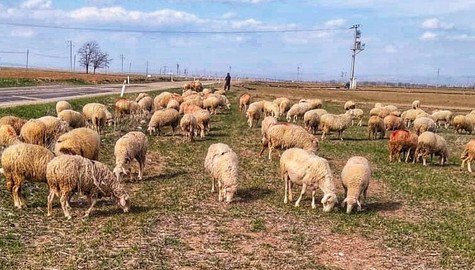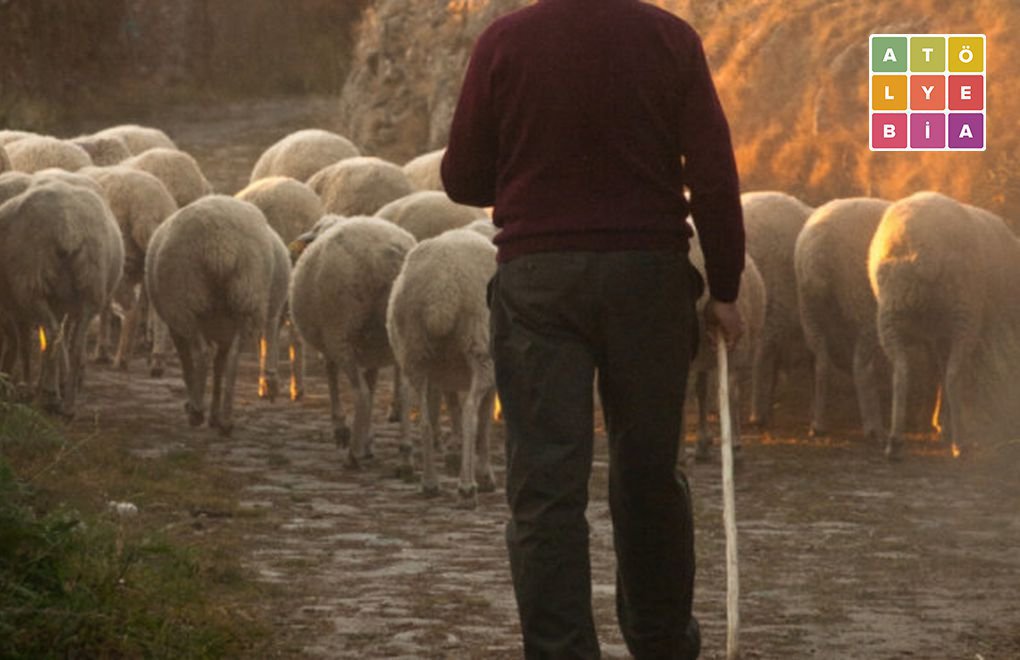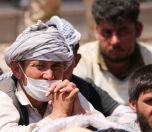* Stock image
Click to read the article in Turkish
I met them during my visit to a relative's village two or three hours from Ankara; Cemal and Muhammed. They work as shepherds in two neighboring houses of the village, which deal with livestock. Since I knew that Afghan shepherds had been working in the village for a while, I wanted to hear their stories. The conversation starts without sitting down and gets deeper with the tea brought by Muhammed from his house.
When I ask Cemal about his hometown, he gets a little confused with his Turkish, which he has been trying to gather for a few days. I ask, "Is it close to Kandahar?" His eyes shine and he shakes his head. I ask about his family. He answers, "I am married and living with my mother." He shows the photo he took with his one-year-old daughter on his cell phone.
She has sparkling eyes and she is beautiful, like any child. Her name is Simayna. She smiles at the lens from her father's arms, seeing it as if it was a duty to be serious while the photo was taken. Perhaps she will see her father years later. When they see each other once more, Simayna will start talking, maybe she will be going to school. She will show him her toys. Of course, if she remembers her father with whom she split up at the age of one, and after a while, she gets used to him as a father.
A journey of 40 days and 40 nights
Afghan immigrants come to Turkey by land over Iran. This is a difficult, dangerous and expensive journey. It is tough because they have to travel in cramped vehicles, sometimes on foot and sometimes in vehicles that they get on in groups. It is dangerous because something bad can happen to them at any time during illegal border crossings. They can get shot by border guards as the latter might think that they are armed. It is expensive because they have to pay high fees to smugglers to get themselves across the border.
Cemal says, "It took me exactly forty days to come here." Muhammed, in Turkey for a year, has been in contact with Cemal since the day he left Afghanistan, though their contact was interrupted occasionally due to the conditions on the road. He passed from Afghanistan to Iran in 2 days. He spent the remaining month in Iran in contact with the smugglers who would cross him with his group, waiting for the appropriate time. Out of the 30 people with whom he tried to cross to Turkey, only two were able to do so. Others were caught at the border. After waiting for 2 days in Van, he reached Ankara by bus on the third day. He stayed in Ankara for 3 days and came to the village where we are now for the job Muhammed found.
For a dowry...
Cemal is 26 years old. When he came before, he had worked in Turkey for 4 years. Then, he returned to Afghanistan. He answers my question about why he returned by saying that he wanted to get married. I curiously ask, "Well, what did you do with the money you earned?" When he tells me that he gave it to the father of the girl he married, I understand that he gathered a dowry.
He had entered Turkey at the age of 21, giving all the money he earned in 4 years for the dowry, set up a home, and hit the road again. I wonder what he will do with the money he will earn. He says, "I have debt." I ask to whom. He points to Muhammed with a laugh.

Muhammed has also been taking care of another farmer's sheep in the village for nearly a year. They are distant relatives. He is one year younger than Cemal. They grew up together in the same village in Afghanistan. Muhammed sent money for Cemal to come back to Turkey. Cemal will pay his debt to him with the money he earns for about 6 months. They send their earnings to Afghans living in İstanbul who deal with money transfer business. They receive a certain commission from the currency they convert and deliver them to their families via international transfer. Sometimes they pay their debts by sending money to each other's families.
Experienced shepherds
Cemal has worked as a shepherd for almost the entire period of his stay in Turkey after a few small jobs. When I ask him "Do you know how to graze sheep," he proudly tells that he looked after 300 sheep before, that his previous employer asked him to come, but that he could not come because he had promised to work somewhere else.
Muhammed intervenes and explains that Afghan shepherds are good at their jobs and that this has contributed to the preference of Afghans in Turkey. I learn that this does not mean a separate expense for business owners, as most Afghans do not smoke. "Afghans are good, they don't do evil," says Muhammed with his Turkish, which has improved a bit compared to Cemal. It becomes obvious that these reliability features are preferred by farmers.
Both earn 3,000 Turkish Lira (TRY) a month and their employers also pay for their meals. Cemal is more fortunate because he doesn't cook his own meals. He eats his meals with the couple in the house where he works. He says, "My mother is really good at cooking." The woman whom he calls "mother" is the woman in the house where he works, his employer. I ask him if she gets angry with him. He says she gets angry when he is picky with food. And adds, "She is my mother too." The two women have been meeting from time to time. She complains about Cemal when he is not eating, to his real mother. His real mother, too, doesn't want him to leave, thinking that he is in safe hands in the place where he is working. Two women have become closer despite not understanding each other's languages.
I ask Nasip Ana how she finds the Afghan shepherds. She tells me that they have very sad stories. She says that an Afghan shepherd named Mustafa, who worked with her before, loved animals very much and took care of each of them one by one. One day, when she saw that he had fallen asleep by the wall where she was sitting in the garden from exhaustion, she cried and cooked him his favorite meal. She describes the Afghans working in the village as "their mama's boys in pursuit of their bread, thousands of kilometers away from their loved ones."
'We neither want to die nor kill'
I start talking about the Taliban issue. They tell that they came to their village from time to time, asking for money or food, and if they did not give, they were beaten. When they gave what they wanted, this time, they would find the state turned against them. They say that one of their acquaintances has been in prison for this crime for two years.
They were also pressuring them to join. I ask why they didn't do that. They say that they have got married, have children, and that they do not want to fight. They emphasize that they want to work like young people living in Turkey, not to "die or kill", and to return to their country and take care of their families with what they have earned with their hard work.
Cemal and Muhammed continue to quietly pursue their flocks these days, when reports about the United States (US) plans to withdraw from Afghanistan are being published. The US' support for Afghan forces against the Soviet Union, in the country that has not been comfortable since its discovery as a battleground of great powers, prepared the ground for the emergence of the Taliban. The children of the "mujahids" who fought on those fronts do not prefer terrorism today and try to overcome the economic difficulties in their country by doing what they know best in Turkey.
They use the experience they gained in the mountains of Afghanistan through animal breeding, even if little, in the steppes of Anatolia. Many of them are favored by their employers. Although they are vulnerable to abuse due to their irregular immigration status, they are concerned about sending money to their families regularly by doing their best work.
Second-largest immigrant population in TurkeyAfghanistan is one of the countries marked by continuous emigration for more than 40 years due to war and conflict. The citizens of Afghanistan constitute the second-largest immigration wave in the world, right after Syrians. This ranking is also valid for Turkey. According to the official figures of the Immigration Administration, there are around 116,000 Afghans in Turkey. But the number of irregular immigrants is increasing every year. Irregular migration, which was 100,800 in 2018, exceeded 200,000 in 2019. The number in 2020 was also above this. Estimates are that there are currently half a million Afghan immigrants. |
(HE/SO/DCE/SD)







-132.jpg)